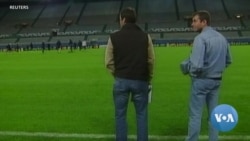Activists say freedom of the press is at risk following a pair of lawsuits brought by Russian oligarchs against a British journalist and her publisher.
Roman Abramovich, owner of Britain’s Chelsea Football Club, and Russia’s state-owned energy giant Rosneft, have both filed defamation lawsuits against journalist Catherine Belton and her publisher HarperCollins UK. The suits are being heard jointly in London’s High Court.
In her 2020 book, "Putin’s People: How the KGB Took Back Russia and then Took on the West,” Belton wrote that Abramovich bought the Chelsea Football Club in 2003 on the orders of Russian President Vladimir Putin to extend Russian influence abroad.
Abramovich’s lawyer told the court that the book contained what he described as "lazy inaccuracies."
“The claimant is described in the book as Putin's cashier and the custodian of Kremlin slush funds,” lawyer Hugh Tomlinson told the court. “What is said to be happening is that Mr. Abramovich is making his wealth available to Putin ... secretly to Putin and his cronies. That is the view the reasonable and ordinary reader would take.”
Abramovich denies he bought Chelsea on Putin’s orders.
Belton cited two sources for the allegation. One was former Russian government insider Sergei Pugachev. The other was anonymous. Defense lawyers told the court that Abramovich's wealth was "to a substantial extent on call when requested" by Putin.
Press freedom advocates say the courts are being used to silence journalists.
“The concern here is that this could lead to — and it’s intended to lead to — a climate of fear which would inhibit investigative journalism, which would inhibit the questioning of those who exercise huge power and wealth and influence. It’s about Russia. It’s about Russian money, but it’s also about Russian influence in the U.K,” said Seamus Dooley, assistant general secretary of Britain’s National Union of Journalists, in an interview with VOA.
Rosneft’s lawyers argued that passages in the book suggested the company had “expropriated” the assets of Russian oil company Yukos in a rigged auction.
Belton's lawyers told the court the claims were well-sourced and based on years of research and interviews. Belton, a former correspondent for Britain’s Financial Times in Moscow who now works for the Reuters news agency, is named as a defendant, meaning her personal assets are at risk.
Dooley told VOA that Britain’s defamation laws are being abused.
“We have to be very clear that there is a right to one’s good name. There is a right to protect your reputation. But when defamation law is used to prevent as is happening it seems to me in this case the legitimate questioning of powerful individuals, when it is used to inhibit legitimate questioning of matters of public interest, then we have to ask if the law is appropriate,” Dooley said.
Financier and human rights activist Bill Browder has led a campaign for justice over the 2009 death of his lawyer, Sergei Magnitsky, who died while in Russian police custody. Browder said he fears a chilling effect on the media.
“You’re going to have less robust reporting and less controversial books about corruption in Russia and about Putin and about the oligarchs because everyone’s going to be afraid of finding themselves in the same situation,” Browder told VOA.
Belton’s book was name-checked in a video posted online by jailed Russian opposition leader Alexey Navalny, in which he claimed Putin owned a secret $1 billion mansion on the Black Sea. Putin denies the claim.
“I’m certain that the Kremlin will use every aspect of this case as propaganda,” Browder said.
The initial two-day hearing, which concluded July 29, was to decide on the meaning of the contested passages. Judge Amanda Tipples said she expected to make a ruling in the coming weeks. Any defamation trial would proceed based on her decision.
This report contains information from Reuters.






